#extremes rather than spectrums we have severely regressed
Text
Episode 18: The Lippstadt Conspiracy

April 797/488. Now that Reinhard’s pick for Kaiser has taken the throne, the oppositional Braunschweig and Littenheim assemble a motley crew of disgruntled nobles to overthrow him and take down Reinhard in the process. Obviously, this goes poorly for them. Before that happens, Hilda takes the initiative to arrange an alliance with Reinhard, firmly positioning herself as the only remotely intelligent noble not already in his admiralty. Braunschweig appoints veteran admiral Merkatz to lead his anti-Reinhard charge; Ferner (unsuccessfully) takes matters into his own hands; and Reinhard, having gotten the jump on Braunschweig, struts around extremely pleased with himself. Annerose, meanwhile, gazes sadly at nothing in particular, and I think Reuental and Mittermeyer are too busy arresting treasonous nobles to go on a date. Oh well.
A few episodes ago, Rebecca introduced some of the less prominent—though still important—characters in the Alliance. Well, the time has come to do the same for the Empire! Episode 18 has some politically important plot stuff, and finally (finally!) properly introduces Hilda, but in terms of hidden meaning below the surface, there’s not much to speak of. So without further ado, I present to you a Who’s Who of some of the Empire’s many side characters (and Hilda)!
Hildegard von Mariendorf

I’ve mentioned Hilda a couple times before, but there wasn’t really any reason to until now, beyond the fact that she’s my favorite character and I love her. Now, we get to spend some much-anticipated quality time with the galaxy’s best and brightest lesbian. I’ll get more into the queerness of Hilda later on, when it’s discussed more directly; for now, let’s take our cue from the show and focus on what she does rather than who she is.

Hilda is the smartest person in every room, especially when that room is a bar full of Imperial aristocrats.
When we first meet Hilda in episode 18, she’s eavesdropping on a bunch of nobles gossiping in a bar about who they plan to support in the upcoming battle for supremacy between Reinhard and Braunschweig et al. Hilda, of course, has already made up her mind, which we see in a flashback to a very recent conversation she had with her father on the subject.

Unlike all the other dads in LoGH, Hilda’s dad, Franz von Mariendorf, is not a piece of shit. He takes his daughter seriously, respects her political opinions, and has no qualms about ceding his family power to her.

The uniquely positive nature of Hilda’s relationship with her dad, like other contrasts and comparisons in the LoGH universe, draws attention to the intentionality of the creative team’s choice to show us so many bad fathers. I’ll be talking about this a LOT more later, so keep it in the back of your mind.
Hilda has (correctly) realized that betting on Reinhard is so safe it can hardly be called a bet, and with her father’s blessing, she arranges to meet with Reinhard himself to discuss terms of a mutually beneficial alliance. Her frankness and obvious political acumen impress Reinhard, who takes an immediate liking to her, accepts her proposal (even agreeing to give it to her in writing, when she pushes him on it), and then leaves to go start the civil war that she predicted.

Did you somehow miss that Hilda is super driven and intense? Her expression here should clear up any remaining doubts.
The most striking aspect of this scene, though, isn’t the political maneuvering—it’s the introduction of the dynamic between Reinhard and Hilda, one of the most interesting relationships in the whole show. Almost right away, Reinhard is caught off guard not by Hilda’s boldness, but by how much he obviously likes her. His invitation for her to dine with him sometime in the future is the first time we’ve ever seen Reinhard take the social initiative with anyone other than Kircheis.

Fun fact, though: The first word that Reinhard ever says to Hilda is actually none other than, you guessed it, “Kircheis.”
As we’ve discussed at length before, relying on heteronormative shortcuts will get you nowhere in LoGH: The mood of this scene, despite containing within it a man and a woman, is as businesslike as Hilda’s uncompromising tone throughout; Reinhard’s interest is, of course, platonic. I love them.
Ernest Mecklinger
As I’ve said, Reinhard/Kircheis and Reuental/Mittermeyer are the two Great Romances of LoGH, so among Reinhard and his admiralty and for the purposes of a queer reading of this show, I’ve been focusing primarily on those four. But the rest of Reinhard’s admiralty is worth talking about too! I’m not going to go through all of them yet, because honestly very few of them make an impression at this point, but I’d like to spotlight a couple (no, not an actual couple, for once) of the more prominent less-prominent admirals who have been adding background color and texture for a while now.
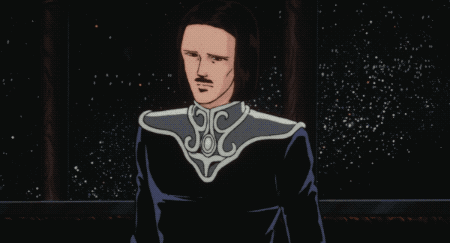
(From “My Conquest.”)
First up, Ernest Mecklinger! Canonically, I think he’s the only one of Reinhard’s admirals who has hobbies beyond “war” and “drinking.” They include: painting, general consumption of the arts, and presumably waxing his mustache. Mecklinger can usually be counted on to be level-headed and generous; he chooses his words carefully, and later on we’ll see scenes in which the only way to describe how he acts is Like A Sweetheart. In the novels, we are told that Mecklinger is nicknamed the “Artist-Admiral” because of how cultured and well-rounded he is.
Fritz Josef Bittenfeld
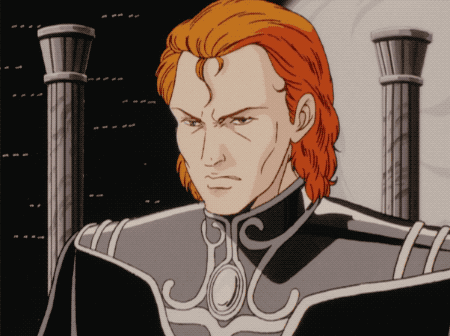
(From episode 16.)
On the complete opposite end of the spectrum is Bittenfeld, the short-tempered, bombastic commander of the Black Lancers (basically picture the intensity and camaraderie of the Rosen Ritter, except a fleet instead of an infantry unit, and without the long history of defection and betrayal). Bittenfeld has already been the recipient of one slap on the wrist—that would have been a lot more severe if not for Kircheis’s intervention—and frequently gets into trouble for rushing into dangerous situations before he’s fully thought them through, both on and off the battlefield.

Look, I did my best to sum up the differences between Bittenfeld and Mecklinger but I honestly don’t know why I bothered when this one exchange captures them so perfectly.
Anton Ferner

Here to answer the eternal question of “What if Oberstein, but hot?” is Anton Ferner, an Imperial cop who is loyal to whomever he dubs most able to make use of his loyalty. Like Oberstein, Ferner views himself less as someone with ambitions of his own and more as a tool to be wielded by someone more powerful. Also like Oberstein, Ferner has an unsettling air about him, made only slightly less so by the fact that he doesn’t habitually remove his eyeballs (that we know of).

You may remember Ferner from back in episode 9, when he sardonically refused to fire on the suicidally destructive Klopstock because a statue of Rudolph von Goldenbaum stood in his way.
However, whereas Oberstein has an overarching philanthropic goal that drives his utilitarian machinations, Ferner’s only motivation seems to be the joy he derives from serving someone he has deemed worthy. And here we get to the main difference between Ferner and Oberstein (other than their respective levels of hotness): Ferner can, in fact, feel joy! Or amusement, anyway.
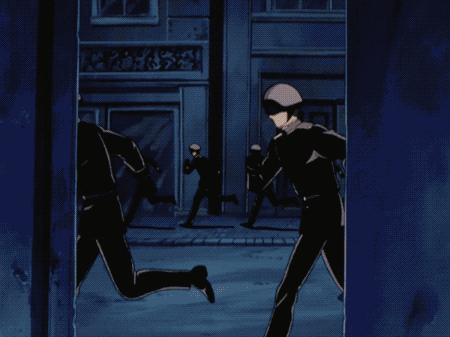
Ferner is constantly smirking when he’s been bested in some way; he absolutely gets off on other people being powerful and talented, but again, we’re not here to kinkshame.
After Ferner ignores Braunschweig’s orders, attempts to assassinate Reinhard on his own, and is summarily defeated, he surrenders to Reinhard and offers him his loyalty. Reinhard, never one to scoff at potential no matter how it ends up in front of him, accepts and, appropriately, gives him to Oberstein as a pet.

I’ll bet you thought I was kidding.
Oberstein and Ferner, the creepiest utilitarian weirdos in the galaxy, have found each other at last! I’m sure they’ll get along great; Ferner, at least, will probably think Oberstein’s removable-eyeball trick is hilarious.

And we must never ever forget that Ferner, according to Matsuri Okuda’s original character designs, started life as a rejected Reuental concept. Which may explain why I think he’s so beautiful.
Otto von Braunschweig (and Ansbach)
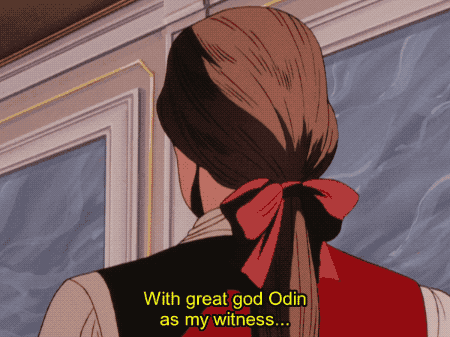
Have you noticed that nobody on Reinhard’s team—not even anyone of noble birth—has that awful George-Washington-style aristocrat hair? Even Mecklinger, who keeps his hair long, doesn’t wear it in a ponytail with an enormous bow. My point is that Braunschweig’s hairstyle, which is hideous, is also a good indicator that he is evil, or at least regressive. And whereas there’s an abundance of nuance when it comes to whether the Empire or the Alliance is morally “better,” everyone can agree on one thing: The Imperial nobles are bad. And Braunschweig, as their leader, is the most bad.

Another way to tell Braunschweig is evil is that he frequently does things like imply that if celebrated admirals don’t do his bidding, he’ll have their young daughters killed.
Braunschweig—who is the late Kaiser Friedrich IV’s son-in-law, by the way—is actually too unambiguously evil to be interesting on his own. The only thing that holds my attention about him beyond the fact that I want to cut off his ponytail is the fact that he is one half of yet another pair of men. And his loyal retainer and counterpart, Ansbach, is in turn only interesting insofar as parallels are set up between his relationship to Braunschweig and Kircheis’s relationship to Reinhard, particularly (so far at least) in episode 9:

Remember this? The similarities between Ansbach and Kircheis’s frenzied searches for Braunschweig and Reinhard, respectively, are too striking to be anything but intentional.
Like I said in my episode 9 post, though, there’s no reason as of yet to think that the relationship between Braunschweig and Ansbach is romantic; even if that’s what the parallels point to, they’re one-sided at this stage, so if Ansbach’s feelings of devotion do cross over into romantic territory, it’s unlikely that they’re reciprocated. Sorry, Ansbach.

Incidentally, Ansbach doesn’t have a last name. Or he doesn’t have a first name. In any case, he only has one name, and it’s Ansbach. Also, if I didn’t hate him so much, I’d be worried about his skin. He looks like he could use several glasses of water, maybe applied directly to his face.
Willibald Joachim von Merkatz (and Schneider)

Merkatz was actually voted the class of 447’s Most Expressive Eyebrows at military academy. Wow!
Merkatz, a very accomplished and grizzled admiral who has been griping about Reinhard and his youth since episode 1, will spend more time in the spotlight later, but I wanted to mention him now for a couple reasons: First of all, his eyebrows are incredible and I can’t stop watching him move them. I honestly don’t know what he’s saying most of the time because I’m too focused on his eyebrows. I’m simultaneously impressed and scared. Second of all, we can go ahead and add Merkatz to the growing stack of (male) characters who are one half of a defined (male) pair.
Merkatz’s counterpart, Bernhard von Schneider, is a young officer who spends most of his screentime in episode 18 with his jaw on the floor while Merkatz explains to him the concept of nuance.

Or maybe he’s just mesmerized by Merkatz’s eyebrows. Same, Schneider. Same.
Anyway, keep an eye on these two, and by these two, I mean Merkatz’s eyebrows. I’d also recommend maybe paying attention to Merkatz himself, and Schneider too, because there will be a lot more to say about them down the line.
Stray Tidbits
I really enjoy how ostentatious literally everything to come into contact with the Imperial nobility is; like how are Reinhard and Kircheis's ships less flashy than something? How?


I am being personally victimized by the fact that this guy’s monocle doesn’t actually fall out.

#Legend of Galactic Heroes#Legend of the Galactic Heroes#author: Elizabeth#Empire#Hilda#Franz von Mariendorf#Mecklinger#Bittenfeld#Ferner#Oberstein#Braunschweig#Ansbach#Merkatz#Bernhard von Schneider#bad dads#good dad!#Merkatz's eyebrows
18 notes
·
View notes
Text
In a different key
Autism has always been around me. It seemed like this mysterious condition that blocks the gears spinning in someone’s head. Even from the outside, it is clearly a life changing condition, both for the individuals and their families. It’s a condition that I’ve been interested in, but never took the time to learn about. Fortunately, Caren Zucker and John Donvan, both parents to Autistic children, did all the leg work for me in their account of Autism, In a different key.

The blue puzzle piece, often used by autism charities as a logo
What is Autism? This is a surprisingly complex question. Indeed, the definition of autism has changed significantly over the years. The main challenge is that autistic traits are not binary, but rather a spectrum of behavioural characteristics. Autistic individuals can include any combination (both incidence and severity) of traits such as aversion to making eye contact, bouts of tantrums, tendency to hurt oneself, limited capacity for verbal / auditory communication, lack of a theory of mind, etc. Some autistic individuals lack the capability to form a complete sentence, while some can be extremely articulate, and even become masters of particular subjects (e.g., Temple Grandin, a cattle expert usually associated with having Asperger’s’ syndrome, in one end of the autism spectrum). In a different key does a great job explaining how the medical profession and the public navigated this messy landscape of traits, progressing from calling everyone mentally feeble or “retarded” to the more nuanced definitions used today.
What surprised me, however, was our lack of understanding of the underlying causes for Autism. I don’t mean to say that all autism treatments are voodoo medicine. Psychologists and Psychiatrists have developed a whole host of interventions like the Applied Behavioral Analysis (ABA, basically conditioning autistic individuals to stop certain behaviour such as hitting oneself) that worked wonders on many, and certainly improved from the defeatist approach of just institutionalising autistic children for life. However, today we still don't understand the genetic or biological basis of the condition. We know the symptoms but not the cause. In some forms of cancer, we understand which exact genes can become “stuck” and cause abnormal tumor growth. This allowed doctors to move from just aggressively hacking away tumors (only for more to grow back) to more targeted therapy on specific cells and genetic pathways. In Autism, given our limited understanding of its mechanics, there are many things that remain unexplained, e.g., why infants tend to develop seemingly normally until they reach age 1-2 then suddenly regress and why autistic individuals seem to lack a theory of mind1. As a result, some of the treatments used in the past, while no doubt backed by theories (often with little supporting evidence), have not withstood the test of time. For example, it was common in the 60s and 70s to blame autism on “refrigerator mums”, who supposedly didn’t show enough affection for their children and caused autism. Other even more ridiculous treatments like facilitated communication (helping autistic children type out messages instead of speaking, which proved to be bogus) and embrace therapy (literally hugging your kid more) also became popular only because we don’t understand autism's causes. More than anything, In a different key shows that medicine today is still a work in progress.
Flipping through the book, it also struck me that medicine is as much of a scientific endeavour as it is a social movement. While many of the doctors and psychologists deserve credit, their work wouldn’t have been possible if without motivated activists promoting their causes. The real heroes in the autism battle are the concerned parents who first started clamoring for more research into the condition and relentlessly sought public attention, all while taking care of autistic children. This is not unique to autism. Again looking at cancer, one could also clearly see the impact of activism. However, what’s clear from the book is that activism still takes a long time – in the case of autism, the fight for more research and treatment has been raging for 70+ years. Nor is the path towards “cure” or more successful interventions a straight one. Reading through the stories of autism organisations coming and going and NGOs fighting each other, I got the sense that we are on a journey that is progressing in the right direction, but only over a long time. What’s also interesting is that Autism research has largely been done in the US and the UK. I do wonder how the process would have played out in countries where the lobbying / research grant system is not as developed.
In a different key is a very interesting book on autism in layman’s terms. Well worth a read.
1. Apparently, some autistic individuals lack a theory of mind. This means that some autistic individuals cannot think from other’s perspective. See the Sally-Anne test for how this is tested – super interesting. https://en.wikipedia.org/wiki/Sally%E2%80%93Anne_test
1 note
·
View note
Text
In a different key
Autism has always been around me. It seemed like this mysterious condition that blocks the gears spinning in someone’s head. Even from the outside, it is clearly a life changing condition, both for the individuals and their families. It’s a condition that I’ve been interested in, but never took the time to learn about. Fortunately, Caren Zucker and John Donvan, both parents to Autistic children, did all the leg work for me in their account of Autism, In a different key.

The blue puzzle piece, a logo often used by autism charities
What is Autism? This is a surprisingly complex question. Indeed, the definition of autism has changed significantly over the years. The main challenge is that autistic traits are not binary, but rather a spectrum of behavioural characteristics. Autistic individuals can include any combination (both incidence and severity) of traits such as aversion to making eye contact, bouts of tantrums, tendency to hurt oneself, limited capacity for verbal / auditory communication, lack of a theory of mind, etc. Some autistic individuals lack the capability to form a complete sentence, while some can be extremely articulate, and even become masters of particular subjects (e.g., Temple Grandin, a cattle expert usually associated with having Asperger’s’ syndrome, in one end of the autism spectrum). In a different key does a great job explaining how the medical profession and the public navigated this messy landscape of traits, progressing from calling everyone mentally feeble or “retarded” to the more nuanced definitions used today.
What surprised me, however, was our lack of understanding of the underlying causes for Autism. I don’t mean to say that all autism treatments are voodoo medicine. Psychologists and Psychiatrists have developed a whole host of interventions like the Applied Behavioral Analysis (ABA, basically conditioning autistic individuals to stop certain behaviour such as hitting oneself) that worked wonders on many, and certainly improved from the defeatist approach of just institutionalising autistic children for life. However, today we still don't understand the genetic or biological basis of the condition. We know the symptoms but not the cause. In some forms of cancer, we understand which exact genes can become “stuck” and cause abnormal tumor growth. This allowed doctors to move from just aggressively hacking away tumors (only for more to grow back) to more targeted therapy on specific cells and genetic pathways. In Autism, given our limited understanding of its mechanics, there are many things that remain unexplained, e.g., why infants tend to develop seemingly normally until they reach age 1-2 then suddenly regress and why autistic individuals seem to lack a theory of mind1. As a result, some of the treatments used in the past, while no doubt backed by theories (often with little supporting evidence), have not withstood the test of time. For example, it was common in the 60s and 70s to blame autism on “refrigerator mums”, who supposedly didn’t show enough affection for their children and caused autism. Other even more ridiculous treatments like facilitated communication (helping autistic children type out messages instead of speaking, which proved to be bogus) and embrace therapy (literally hugging your kid more) also became popular only because we don’t understand autism's causes. More than anything, In a different key shows that medicine today is still a work in progress.
Flipping through the book, it also struck me that medicine is as much of a scientific endeavour as it is a social movement. While many of the doctors and psychologists deserve credit, their work wouldn’t have been possible if without motivated activists promoting their causes. The real heroes in the autism battle are the concerned parents who first started clamoring for more research into the condition and relentlessly sought public attention, all while taking care of autistic children. This is not unique to autism. Again looking at cancer, one could also clearly see the impact of activism. However, what’s clear from the book is that activism still takes a long time – in the case of autism, the fight for more research and treatment has been raging for 70+ years. Nor is the path towards “cure” or more successful interventions a straight one. Reading through the stories of autism organisations coming and going and NGOs fighting each other, I got the sense that we are on a journey that is progressing in the right direction, but only over a long time. What’s also interesting is that Autism research has largely been done in the US and the UK. I do wonder how the process would have played out in countries where the lobbying / research grant system is not as developed.
In a different key is a very interesting book on autism in layman’s terms. Well worth a read.
1. Apparently, some autistic individuals lack a theory of mind. This means that some autistic individuals cannot think from other’s perspective. See the Sally-Anne test for how this is tested – super interesting. https://en.wikipedia.org/wiki/Sally%E2%80%93Anne_test
1 note
·
View note
Text
If you did not already know
Fair Forest
The potential lack of fairness in the outputs of machine learning algorithms has recently gained attention both within the research community as well as in society more broadly. Surprisingly, there is no prior work developing tree-induction algorithms for building fair decision trees or fair random forests. These methods have widespread popularity as they are one of the few to be simultaneously interpretable, non-linear, and easy-to-use. In this paper we develop, to our knowledge, the first technique for the induction of fair decision trees. We show that our ‘Fair Forest’ retains the benefits of the tree-based approach, while providing both greater accuracy and fairness than other alternatives, for both ‘group fairness’ and ‘individual fairness.” We also introduce new measures for fairness which are able to handle multinomial and continues attributes as well as regression problems, as opposed to binary attributes and labels only. Finally, we demonstrate a new, more robust evaluation procedure for algorithms that considers the dataset in its entirety rather than only a specific protected attribute. …
Extreme View Synthesis
We present Extreme View Synthesis, a solution for novel view extrapolation when the number of input images is small. Occlusions and depth uncertainty, in this context, are two of the most pressing issues, and worsen as the degree of extrapolation increases. State-of-the-art methods approach this problem by leveraging explicit geometric constraints, or learned priors. Our key insight is that only by modeling both depth uncertainty and image priors can the extreme cases be solved. We first generate a depth probability volume for the novel view and synthesize an estimate of the sought image. Then, we use learned priors combined with depth uncertainty, to refine it. Our method is the first to show visually pleasing results for baseline magnifications of up to 30X. …
Heuristics Allied with Distant Supervision (HAnDS)
Fine-grained Entity Recognition (FgER) is the task of detecting and classifying entity mentions to a large set of types spanning diverse domains such as biomedical, finance and sports. We observe that when the type set spans several domains, detection of entity mention becomes a limitation for supervised learning models. The primary reason being lack of dataset where entity boundaries are properly annotated while covering a large spectrum of entity types. Our work directly addresses this issue. We propose Heuristics Allied with Distant Supervision (HAnDS) framework to automatically construct a quality dataset suitable for the FgER task. HAnDS framework exploits the high interlink among Wikipedia and Freebase in a pipelined manner, reducing annotation errors introduced by naively using distant supervision approach. Using HAnDS framework, we create two datasets, one suitable for building FgER systems recognizing up to 118 entity types based on the FIGER type hierarchy and another for up to 1115 entity types based on the TypeNet hierarchy. Our extensive empirical experimentation warrants the quality of the generated datasets. Along with this, we also provide a manually annotated dataset for benchmarking FgER systems. …
Generalized Strucutral Causal Model (GSCM)
Structural causal models are a popular tool to describe causal relations in systems in many fields such as economy, the social sciences, and biology. In this work, we show that these models are not flexible enough in general to give a complete causal representation of equilibrium states in dynamical systems that do not have a unique stable equilibrium independent of initial conditions. We prove that our proposed generalized structural causal models do capture the essential causal semantics that characterize these systems. We illustrate the power and flexibility of this extension on a dynamical system corresponding to a basic enzymatic reaction. We motivate our approach further by showing that it also efficiently describes the effects of interventions on functional laws such as the ideal gas law. … https://bit.ly/2ZFjSPB
0 notes
Text
PC Conundrum - When Political Correctness Hinders the Disabled - PEER NEWS
New Post has been published on https://citizentruth.org/pc-conundrum-when-political-correctness-hinders-the-disabled/
PC Conundrum - When Political Correctness Hinders the Disabled
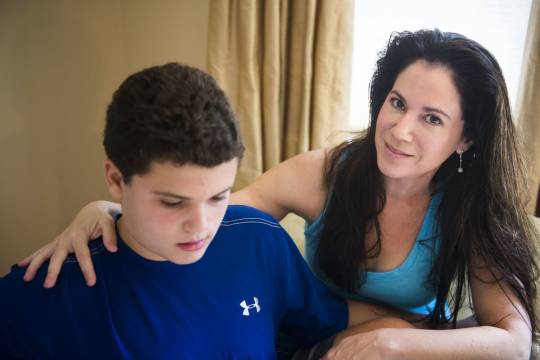
What’s in a name? That which we call a rose,
By any other name would smell as sweet…
�� ~ William Shakespeare
Consider this true incident recounted by the father of an adult son with severe Autism. One evening his son unexpectedly “snapped” – flooded by hormones and impulsivity – and began assaulting his parents uncontrollably. Panicked, the father placed the following 911 call: “I have an emergency. My son is attacking me and I need help to restrain him. He has autism and is mentally retarded so do not draw your weapons!” Message received, the police response was swift and informed, and the young man was safely subdued and treated.
Now imagine a twist on that urgent 911 call: “This is an emergency, I’m being attacked by my son. Do not draw your weapons he is–‘differently abled.’” Doesn’t quite work, does it? To the contrary, it’s so confoundingly vague the caller must offer further clarification, fast ~ how is he “different”? What’s his exact problem? Therein lies the difficulty of political correctness gone awry, where the earnest attempt to secure equal treatment for the disabled obfuscates the truth of who they are and what they might need.
The young man above is autistic, but not mentally retarded. When I asked his father why he used the additional label, his answer was unadorned: “I needed to use language everyone understands.” So in moments of crisis, where intervention is informed by the child’s impairment, it’s crucial that language reflect common understanding to avoid catastrophe. Put another way, in exigent circumstances, political correctness must yield to definitional precision.
When I wrote my unguarded account about my son, Autism Uncensored: Pulling Back the Curtain (April 2018), my goal was to speak truth about a difficult topic. “Differently abled,” a recent scrubbing of the now disfavored term, “disabled,” seems to do the opposite by implying that individual abilities are merely a matter of degree. Not everything exists on a continuum, and to pretend we all function on a socially contiguous spectrum is to deny the enormous challenges for people like my son, Zack, to perform even most rudimentary tasks like boarding a bus, feeding oneself or sitting quietly without flapping. “Differently abled” is insulting to Zack who – if he had sufficient language – would be happy to list all the ways he struggles to do what the rest of us take for granted.
“Differently abled” is also pragmatically useless. Take the milestone of filling out a job application for Zack. Am I truly to identify Zack as “differently abled,” avoid the “A” word and leave employers to guess at his characteristic deficits? Zack’s autism is not tantamount to disqualification from all jobs, but it does disqualify him from many. To pretend otherwise is a cruel game which sets him up for failure since there are whole categories of jobs he simply cannot do. Try this instead. Zack is autistic, he’s unable to comprehend nuanced language or social cues, and he has limited verbal language. But he can follow concrete directions, has extreme visual attention to detail, an unusually strong physique and hand-eye coordination, and kick-ass strength. Now let’s talk about how my autistic son can be of best use.
“Differently abled” literally erases the disabled under an anonymous blanket that masks traits society now finally seeks to honor and embrace. Employers now actively seek autistic employees for tasks that require sequencing, obsessive attention to detail and scrupulous work ethic – hence news of one group of autistic adults who are charged with cleaning, separating and lining up surgical tools for pre-op. The recent surge of t.v. and movie characters such as “Speechless,” “The Good Doctor” and “Atypical” don’t dance around their characters’ disabilities but rather shout them from the rooftops. Against this social exfoliation, the term “differently abled” feels regressive, not revolutionary. Zack has a cognitive disorder which makes him compliant, comfortable taking directions, incapable of subterfuge. Here’s the revolutionary part –it’s fine. Zack can miss social cues and still get trained up to do a job that integrates him into society as a contributing member.
Try as a might, I can’t help but view “differently abled” as overcompensating for slurs against the disabled. When we shy away from diagnoses and allow our children’s disorders to be nebulized it is a form of shame repacked. A diluting of the truth of who they are in order to shape them into a more socially acceptable category – one that dare not reveal impairments or limits. True confidence lies in the call by the disabled to “boldly go where everyone has gone before”; now it’s a limp plea for acceptance which begs, “we’re not really so different from the rest of you…please?” As advocates, we must not get distracted from real fights about jobs and fair pay by allowing them to become comingled with petty disputes about semantics. Our energy must focus on securing vocational schools, fair housing, accessible transit and recreation for our disabled children while still calling them what they are.
So we are all clear, Zack is autistic, and he’s good at it. My understanding of who he is, his understanding of who he is, is so clear-eyed we don’t feel the need to hide. This is a healthy attitude we would all do well to cultivate for ourselves and for our children irrespective of their nascent abilities. Slurs that ridicule the disabled for their inherent traits are genuinely searing, but to react by diluting their identities is to play their game on others’ terms rather than our own. We must not allow that. I will not cower to the slur, but nor will I desperately seek to assimilate with the norm. After all, a rose by any other name is still…autistic.
0 notes
Photo

A Philosopher’s Madness by Lishan Chan
Finished this slim volume on my way back to Singapore. Unlike accounts on anxiety which in their nature are anxiety-inducing (like Smith’s Monkey Mind), Chan’s A Philosopher’s Madness is not something that upon reading, will make you go crazy. It’s unapologetically calm in describing the state of crazy, in which you are out of touch with reality. Her language reminds me of my writing for philosophy modules in uni - squeaky clean, precise, almost clinical, without any need for garnish or embellishments.
Lishan Chan studied politics and subsequently philosophy in UK. Upon returning to Singapore, she took up a research scholarship program offered by NUS in philosophy. The book aims to explore the possible relationship between philosophizing and her psychotic episode, just like how many have tried to connect existentialism with depression.
I have read probably quite a considerable number of accounts on depression and anxiety, which are more common. It is very easy to fall on a spectrum when it comes to depression/anxiety, and this has a few consequences: 1) You don’t always have to label them as a mental illness 2) It doesn’t have to be a diagnosis/condition that you have to carry with you throughout your life 3) People might understand, relate, and say that it’s just a human response to a number of stressors in your life 4) People think that it is a testament to your lack of life skills, and this can be improved over time, and coming out of the rut of anxiety/depression, you’ll come out stronger 5) It will all pass (“tough times don’t last, tough people do”) 6) You pose no danger to anyone.
Number 2 means that, when you are filling in a job or school application form, you don’t have to tick the history of mental illness column. It’s pretty hard to get your schizophrenic episode go by undetected, it’s easier with depressive or anxious episodes, unless in severe cases. Number 3 means that there is a fair amount of understanding for depression or anxiety. Number 4 means that, in the long run, the experience is somehow good for you. Number 6 means that you probably realize that depression and anxiety don’t have to be contagious, and the worst case scenarios are self-harm and self-sabotaging (whose consequences might bleed into other people’s lives, but it’s more likely for the sufferer to hurt herself than she to hurt others).
But when you have to face the mad, you don’t know what the worst case scenario is - simply because you don’t understand why, and how, they do what they do. Everything seems possible. In normal cases, my previous sentence is motivational, in this case, not so much. It goes to show that the discomfort you experience in the presence of the mad, stems from a complete absence of understanding. It makes you wonder, are they the truly mad ones - or are you? Maybe you see yourself, your occasional nervous tics reflected in them, only tuned a few decimals louder in terms of intensity and frequency. It’s like holding a hazy mirror. You don’t want to think about this, in case understanding breeds empathy, and empathy leads you down to the path of metamorphosis - so you avoid seeking an explanation even more fervently. It’s a vicious cycle.
So we see that, without ignoring the existing social stigma attached to depression and anxiety, we can safely say that schizophrenia does not get to enjoy the same amount of social sanction reduction in comparison. We call anxiety/depression patients the depressed, the stressed out, the melancholic ones. We call the schizophrenic mad, crazy, shen jing bing. This is because, I think, you can fairly reason with the anxious. Schizophrenia completely reverses and fragments your thought process - it does not start as a matter of obsessions with worries or a shift in focus.
Perhaps I should blame Descartes. As a result of taking his advice in Meditations to ‘doubt as much as you can’, I attempted to do exactly that; doubt as much as I could. I questioned every statement, challenged every perception. It was the beginning of a relentless road to mental illness.
You turn not just the value of truth, but also the approach to truth upside down. Inevitably, your trust in the world erodes - all that make up the world that we live in - other people, social roles, belief systems, the way the world is run. If you take thinking to its extreme, I think you can see how shaky all mechanisms we base our judgment of truth on are. Funnily enough, I think, the schizophrenics doubt everything but themselves. But should they? Does psychosis automatically render their experience invalid, once they come out of it?
But the things that make sense to me when I am unwell make sense to no one else. This is what it means to be out of touch with reality. Today, I still wonder what it all means. If I had been brought to God through a period of madness rather than because of suffering and madness, would it follow that my current belief in God is delusional? If I were mad and had a religious experience, does it count as a genuine religious experience?
Chan mentions at least three times in the book that she still “fears relapse”. I read a recent article on her by T Singapore a few days ago and news has it that she has not had any relapse for the past 10 years. During remission, ex-patients like Chan usually have to disseminate a relapse plan to their closest, because when you are mad, you don’t realize that you are mad. You need an observer to be there to realize that you are mad, a little bit like Schrodinger’s cat problem, or maybe a tree falling in the forest would make a better analogy.
So if you don’t have an observer to say to you that you are mad, are you still mad? This leads to the gray categorization of the schizophrenia, stated in the book:
Who is right? Is psychosis a mental condition or a physical condition? Is psychosis a sickness or a ‘condition’?
(...)
I summarize what I see as the possible positions as follows:
- If psychosis is a physical disease, then the chemicals in the brain or a particular brain structure are identified with the experience of psychosis (extreme stress resulting in delusions).
- If psychosis is a physical condition, then stress (for instance) is a physical rather than a mental entity. Chemicals in the brain or brain structure are not identified with the experience of psychosis, although we might recognize that there are patterns or correspondence between the two.
- If psychosis is a mental disease, then psychosis would as a consequence be a mental disorder. A theory of psychosis would involve explaining the experience of beliefs that are false. The word ‘disease’ emphasizes the absence of wellness. The brain takes back stage here.
- If psychosis is a mental condition, then there is no disorder or absence of wellness. Rather, experience of psychosis is simply a different and aberrant experience, one that can be explained with recourse to the individual’s perceptions and state of mind.
It’s probably never one or the other.
Now, no account on mental illness is complete without mentioning its undeniable correlation with creativity:
This raises a question - is creativity and productivity in the arts somehow linked to emotional turmoil or unstable mental states? If so, are we losing something valuable to society by medicating anyone who shows evidence of unstable mental illness?
Something that I can’t help but question though, can be found in the middle of this paragraph:
Secondly, chemical imbalance might well be a parallel event alongside the conscious experience of mental illness without a necessarily causal relationship. It is commonplace scientific practice to equate correlation with causation, but philosophically speaking, there is a gap which needs to be acknowledged.
As far as I’m concerned…. conflating correlation with causation is cardinal sin in any field of science. It’s fallacy.
Lastly one fascinating yet slightly worrying part of the book is the appendix. This consists of Chan’s “thoughts at various stages of (her) illness.” Fascinating and slightly worrying because I think a lot of it actually make sense?
E.g.
Truth can only be found by slowly thinking through things. If you wish to be the sort of person who finds the truth, be prepared to accept the consequences. A person who finds the truth, or a person who is at least aware of the truth, is a person who refuses to join in the pretense. People who refuse to join in the pretense must lose the game. But have they really lost, if they fall out of the game? Have they really lost, if they move out of the periphery of the game?
Without pretense, reality becomes clearer to one’s line of vision. Without pretense, it is possible to detach oneself from the various games that people play. Without pretense, it is possible to become an observer, as opposed to a spectator.
One might argue that this is impossible, for there is at least one perspective that is detached observer cannot escape. This perspective is the perspective of the detached observer. To be a detached observer of yourself being a detached observer seems to lead to an infinite regress? What does it amount to?
Personally, I think, if the most arduous pursuit of truth costs one’s mind, I would rather keep my mind please. I hope I’m not choosing ignorance when I say that sometimes… it gets tiring and the end justifies the means
0 notes